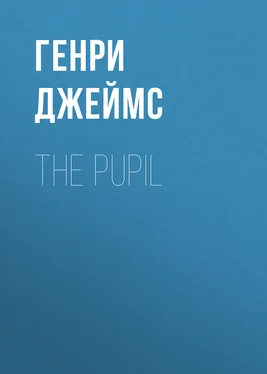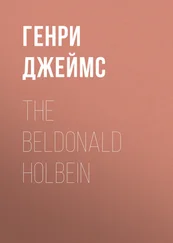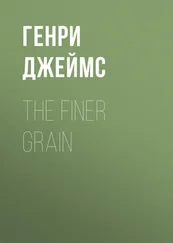Генри Джеймс - The Pupil
Здесь есть возможность читать онлайн «Генри Джеймс - The Pupil» — ознакомительный отрывок электронной книги совершенно бесплатно, а после прочтения отрывка купить полную версию. В некоторых случаях можно слушать аудио, скачать через торрент в формате fb2 и присутствует краткое содержание. Жанр: foreign_prose, foreign_antique, на английском языке. Описание произведения, (предисловие) а так же отзывы посетителей доступны на портале библиотеки ЛибКат.
- Название:The Pupil
- Автор:
- Жанр:
- Год:неизвестен
- ISBN:нет данных
- Рейтинг книги:5 / 5. Голосов: 1
-
Избранное:Добавить в избранное
- Отзывы:
-
Ваша оценка:
- 100
- 1
- 2
- 3
- 4
- 5
The Pupil: краткое содержание, описание и аннотация
Предлагаем к чтению аннотацию, описание, краткое содержание или предисловие (зависит от того, что написал сам автор книги «The Pupil»). Если вы не нашли необходимую информацию о книге — напишите в комментариях, мы постараемся отыскать её.
The Pupil — читать онлайн ознакомительный отрывок
Ниже представлен текст книги, разбитый по страницам. Система сохранения места последней прочитанной страницы, позволяет с удобством читать онлайн бесплатно книгу «The Pupil», без необходимости каждый раз заново искать на чём Вы остановились. Поставьте закладку, и сможете в любой момент перейти на страницу, на которой закончили чтение.
Интервал:
Закладка:
In one respect, however, certainly they achieved no rigour—they were wonderfully amiable and ecstatic about Morgan. It was a genuine tenderness, an artless admiration, equally strong in each. They even praised his beauty, which was small, and were as afraid of him as if they felt him of finer clay. They spoke of him as a little angel and a prodigy—they touched on his want of health with long vague faces. Pemberton feared at first an extravagance that might make him hate the boy, but before this happened he had become extravagant himself. Later, when he had grown rather to hate the others, it was a bribe to patience for him that they were at any rate nice about Morgan, going on tiptoe if they fancied he was showing symptoms, and even giving up somebody’s “day” to procure him a pleasure. Mixed with this too was the oddest wish to make him independent, as if they had felt themselves not good enough for him. They passed him over to the new members of their circle very much as if wishing to force some charity of adoption on so free an agent and get rid of their own charge. They were delighted when they saw Morgan take so to his kind playfellow, and could think of no higher praise for the young man. It was strange how they contrived to reconcile the appearance, and indeed the essential fact, of adoring the child with their eagerness to wash their hands of him. Did they want to get rid of him before he should find them out? Pemberton was finding them out month by month. The boy’s fond family, however this might be, turned their backs with exaggerated delicacy, as if to avoid the reproach of interfering. Seeing in time how little he had in common with them—it was by them he first observed it; they proclaimed it with complete humility—his companion was moved to speculate on the mysteries of transmission, the far jumps of heredity. Where his detachment from most of the things they represented had come from was more than an observer could say—it certainly had burrowed under two or three generations.
As for Pemberton’s own estimate of his pupil, it was a good while before he got the point of view, so little had he been prepared for it by the smug young barbarians to whom the tradition of tutorship, as hitherto revealed to him, had been adjusted. Morgan was scrappy and surprising, deficient in many properties supposed common to the genus and abounding in others that were the portion only of the supernaturally clever. One day his friend made a great stride: it cleared up the question to perceive that Morgan was supernaturally clever and that, though the formula was temporarily meagre, this would be the only assumption on which one could successfully deal with him. He had the general quality of a child for whom life had not been simplified by school, a kind of homebred sensibility which might have been as bad for himself but was charming for others, and a whole range of refinement and perception—little musical vibrations as taking as picked-up airs—begotten by wandering about Europe at the tail of his migratory tribe. This might not have been an education to recommend in advance, but its results with so special a subject were as appreciable as the marks on a piece of fine porcelain. There was at the same time in him a small strain of stoicism, doubtless the fruit of having had to begin early to bear pain, which counted for pluck and made it of less consequence that he might have been thought at school rather a polyglot little beast. Pemberton indeed quickly found himself rejoicing that school was out of the question: in any million of boys it was probably good for all but one, and Morgan was that millionth. It would have made him comparative and superior—it might have made him really require kicking. Pemberton would try to be school himself—a bigger seminary than five hundred grazing donkeys, so that, winning no prizes, the boy would remain unconscious and irresponsible and amusing—amusing, because, though life was already intense in his childish nature, freshness still made there a strong draught for jokes. It turned out that even in the still air of Morgan’s various disabilities jokes flourished greatly. He was a pale lean acute undeveloped little cosmopolite, who liked intellectual gymnastics and who also, as regards the behaviour of mankind, had noticed more things than you might suppose, but who nevertheless had his proper playroom of superstitions, where he smashed a dozen toys a day.
CHAPTER III
At Nice once, toward evening, as the pair rested in the open air after a walk, and looked over the sea at the pink western lights, he said suddenly to his comrade: “Do you like it, you know—being with us all in this intimate way?”
“My dear fellow, why should I stay if I didn’t?”
“How do I know you’ll stay? I’m almost sure you won’t, very long.”
“I hope you don’t mean to dismiss me,” said Pemberton.
Morgan debated, looking at the sunset. “I think if I did right I ought to.”
“Well, I know I’m supposed to instruct you in virtue; but in that case don’t do right.”
“’You’re very young—fortunately,” Morgan went on, turning to him again.
“Oh yes, compared with you!”
“Therefore it won’t matter so much if you do lose a lot of time.”
“That’s the way to look at it,” said Pemberton accommodatingly.
They were silent a minute; after which the boy asked: “Do you like my father and my mother very much?”
“Dear me, yes. They’re charming people.”
Morgan received this with another silence; then unexpectedly, familiarly, but at the same time affectionately, he remarked: “You’re a jolly old humbug!”
For a particular reason the words made our young man change colour. The boy noticed in an instant that he had turned red, whereupon he turned red himself and pupil and master exchanged a longish glance in which there was a consciousness of many more things than are usually touched upon, even tacitly, in such a relation. It produced for Pemberton an embarrassment; it raised in a shadowy form a question—this was the first glimpse of it—destined to play a singular and, as he imagined, owing to the altogether peculiar conditions, an unprecedented part in his intercourse with his little companion. Later, when he found himself talking with the youngster in a way in which few youngsters could ever have been talked with, he thought of that clumsy moment on the bench at Nice as the dawn of an understanding that had broadened. What had added to the clumsiness then was that he thought it his duty to declare to Morgan that he might abuse him, Pemberton, as much as he liked, but must never abuse his parents. To this Morgan had the easy retort that he hadn’t dreamed of abusing them; which appeared to be true: it put Pemberton in the wrong.
“Then why am I a humbug for saying I think them charming?” the young man asked, conscious of a certain rashness.
“Well—they’re not your parents.”
“They love you better than anything in the world—never forget that,” said Pemberton.
“Is that why you like them so much?”
“They’re very kind to me,” Pemberton replied evasively.
“You are a humbug!” laughed Morgan, passing an arm into his tutor’s. He leaned against him looking oft at the sea again and swinging his long thin legs.
“Don’t kick my shins,” said Pemberton while he reflected “Hang it, I can’t complain of them to the child!”
“There’s another reason, too,” Morgan went on, keeping his legs still.
“Another reason for what?”
“Besides their not being your parents.”
“I don’t understand you,” said Pemberton.
“Well, you will before long. All right!”
He did understand fully before long, but he made a fight even with himself before he confessed it. He thought it the oddest thing to have a struggle with the child about. He wondered he didn’t hate the hope of the Moreens for bringing the struggle on. But by the time it began any such sentiment for that scion was closed to him. Morgan was a special case, and to know him was to accept him on his own odd terms. Pemberton had spent his aversion to special cases before arriving at knowledge. When at last he did arrive his quandary was great. Against every interest he had attached himself. They would have to meet things together. Before they went home that evening at Nice the boy had said, clinging to his arm:
Читать дальшеИнтервал:
Закладка:
Похожие книги на «The Pupil»
Представляем Вашему вниманию похожие книги на «The Pupil» списком для выбора. Мы отобрали схожую по названию и смыслу литературу в надежде предоставить читателям больше вариантов отыскать новые, интересные, ещё непрочитанные произведения.
Обсуждение, отзывы о книге «The Pupil» и просто собственные мнения читателей. Оставьте ваши комментарии, напишите, что Вы думаете о произведении, его смысле или главных героях. Укажите что конкретно понравилось, а что нет, и почему Вы так считаете.












